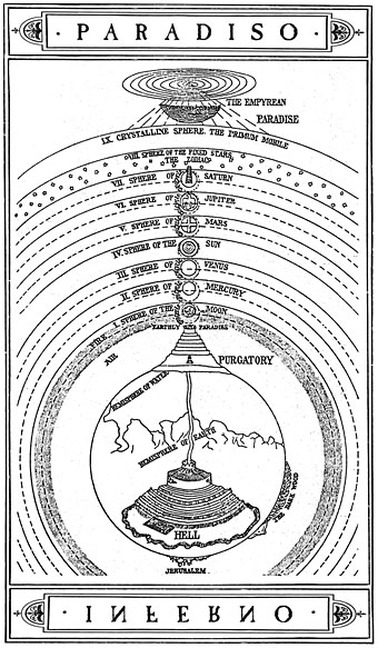One of my biggest grievances with the Numenera setting is that while the books suggest that setting it as future Earth is meant to allow the GM to include stuff like communism (I think that's an actual example!) or Inspector Clouseau films or, being less facetious, cultural references to our own world (e.g., a character quoting the Bible or using a conventional turn of phrase), the manual
also says (and our marching orders were consistent with this) that nothing from our era can survive in normal terms into Numenera so you can't have a dog that is a dog, if you have a dog it has to be an octopus with 1d4 (haha, no d4 actually) heads.
This could not be more antithetical to the philosophy that has driven me in my own work (especially but not exclusively Fallen Gods), which is that there is a unity to our lives: to the natural world, to our language, to our cultural signifiers, our religion, our family structures, etc. To give a dumb example, the phrase "cultivate one's own garden" is situated in a whole web of meaning -- not just literary (Candide) and religious (the conversation in Candide immediately draws a connection between the act of garden-tending and the Garden of Eden), but also ecological (it presupposes a wilderness that exists in contrast to gardens) and economic (it presupposes a level of economic development in which people cultivate not just farmland but gardens) and cultural/historical (it invokes the hortus conclusus as a longstanding "safe space"(!!)) and social (the expression is not referring to huge public gardens or estate gardens, but to the smaller kind of family gardens perhaps tended by a grandmother and played in by her children etc.). It's not necessary that the listener be able to
consciously follow every strand of that web (I'm sure I've missed or mistaken many), but the web trembles all the same, as long as it has not been totally torn apart.
"Cultivate one's own garden" can't exist in TTON because, inter alia, as far as I know there are no gardens in the game, and to the extent the Ninth World has gardens, I'm sure they only grow piranha plants, except that since piranhas in the setting are actually lobsters, we'd have to call them Venus fly traps, except because there's no Venus and flies are actually robotic transformers that switch between cars and urethras, we can't call them that either.... But aside from the inability to use that or some other particular expression (and believe me, this was something that pained me daily, like, you can't call someone "loyal as a dog" because there are no dogs, they can't grin "wolfishly" because there are no wolves, etc., etc.) The problem is,
no webs exist at all.
Planescape was not a perfect setting -- a lot of it is idiotic, like Mount Celestia as a concept seems horribly stupid -- but at least as filtered into PS:T, there were some webs. For instance, the "rule of three" is a web with strands that are both within the setting and within the broader life of the player. Internally, it comes up over and over again, in different permutations (e.g., enemies three, the three principal incarnations). And externally, it conjures not just the fairy tale
norm of three but also the Trinity, and all sorts of strands radiating out from those concepts. And the game's characters were clearly designed to reference well-worn and familiar tropes -- to subvert them (to an extent) but at the outset to rely on them as shorthand to get the player up to speed -- Dak'kon as a ronin samurai, Grace as the whore-madonna, etc.
In writing this out, I Unlocked a Memory: just about six years ago, in early March 2013, I told an all-around genius I knew from Primordia's development that I was excited about the TTON Kickstarter because the team seemed to have captured the PS:T feel. Here's what she said:
They didn't (yet), and they won't.
Not enough 'stupid' to have traction. The setting will go the way of nWoD, with a bunch of dissociated ideas no one cares about. Planescape the setting was
stupid. It was written on the intellectual level of college kids in pre-Internet times. Because of the former, its philosophies make no sense but have memetic power; because of the latter, its logistics couldn’t have possibly been made to work, but hardly anyone really cares. What I see in the new Torment is too unusual and
not stupid enough to have traction; and RPG writers famously suck at logistics, so I don't trust them to actually make use of the weirdness enough to deserve the “science” qualifier. Neat art, though.
When I got huffy about the "stupid" point, she added:
Yes. Planescape:Torment got rid of most – if not all – of the original stupid (the game is a theme park ride through a weird world, what might be left doesn’t stick out as much as it would in a cooperative tabletop RPG) .... But them starting with an inherently ludicrous, memetically (don’t touch my spelling, Word 2007) powerful “the Universe according to college kids” concept and brushing it up was an advantage.
As to my specific question re: whether it would miss the humor of Morte and Nordrom:
Yes. Modrons were polyhedral creatures from a plane of Law – living dice. Because the multiverse ran on dice. I don’t think Monte Cook will be having any of that (capitalizing on quirks and uniqueness); rather, I expect soft focus and tired old tropes: “so, the zzbarloxxians are big and strong, let’s roll out the tough dumb guy stereotypes”.
She wasn't right about all of it, but she basically called it.













![Glory to Codexia! [2012] Codex 2012](/forums/smiles/campaign_tags/campaign_slushfund2012.png)










